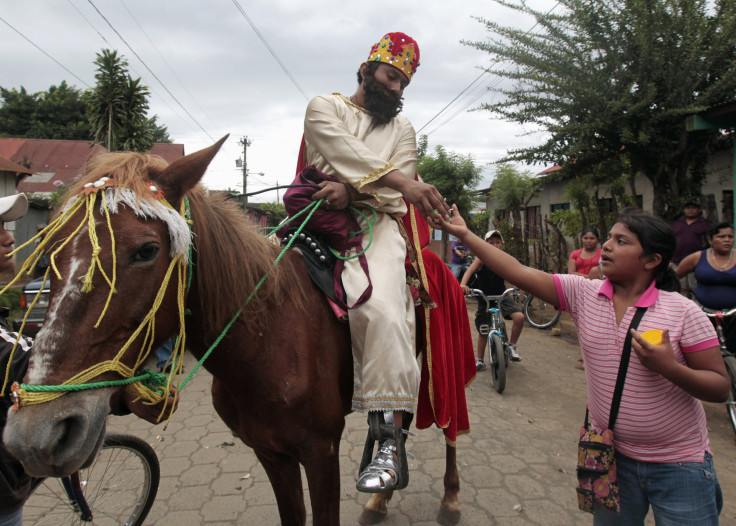Three Kings Day 2021: 12 Facts And Traditions On The 12th Day Of Christmas
KEY POINTS
- Three Kings Day or Epiphany is celebrated on Jan. 6 each year
- It marks the day Gaspar, Balthasar and Melchior visited the infant Jesus and offered him gifts of gold, frankincense and myrrh
- Children may leave their shoes out on the Epiphany for presents
Three Kings Day is here, and it marks the adoration of baby Jesus by the three Wise Men or Magi.
While many Christians are likely familiar with the annual celebration, some may not be aware of the holiday, its origin and what it represents. Here are 12 facts you might not have known about Three Kings Day.
1. Many names
The holiday, which falls on Jan. 6 each year, has more than one name as it is celebrated in many cultures. It is usually called the Epiphany but is known in Spanish-speaking countries as Dia De Los Tres Reyes (Day of The Three Kings), according to the website of the National Museum of American History. It is also referred to as Little Christmas, Denha, Theophany and the Baptism of Jesus.
2. Gifts for baby Jesus
The gifts given to Jesus were gold, frankincense and myrrh, which are symbolic of his importance. The gold represents his royal standing, frankincense his divine birth and myrrh his mortality, according to the Escalon Times.
3. Shoes instead of socks
Children may leave their shoes out on the Epiphany for presents similar to stockings hung over the mantle on Christmas Eve. The shoes are filled with hay or treats for the Three Wise Men’s camels. In exchange, candies and toys are left for the children.
4. The night before the Epiphany
In some parts of the world, Twelfth Night is the evening that precedes the Epiphany, and Christmas decorations should remain up until then. Also, until as recently as the 1950s, Twelfth Night was a time for wassailing.
5. What's for dinner?
As a way to celebrate the holiday, it is a tradition in some parts of the world to serve roast lamb on the Epiphany.
6. Santa Claus who?
In Latin America, where the three Magi are more prominent figures than Santa Claus, the Epiphany is more important than other religious holidays for many households.

7. Bring a cake to celebrate
It is customary for some traditions to bake ring-shaped cakes and hide a plastic baby figurine representing the baby Jesus inside. The baked cake is often referred to as Rosca de Reyes or "The King’s Ring."
8. The Theophany
St. Gregory of Nazianzus referred to the special holiday as the Theophany, saying that it is a day commemorating the "holy nativity of Christ," according to National Today.
9. The Twelfth Day of Christmas
Revisions of the General Roman Calendar makes the date of Three Kings Day variable, occurring on the Sunday between Jan. 2 and 8, but it is still more widely celebrated 12 days after Christmas on Jan. 6.
10. Mysteries before the big day
Many believe mysterious events happened even before Jesus’ birth occurred, with perhaps the most notable being the appearance of the Star of Bethlehem. This new star is believed to have appeared in the evening sky just before the arrival of Jesus.
11. Origins from Rome to Egypt
Though Three Kings Day originated in the eastern half of the Roman Empire in 200 A.D., Clement of Alexandria wrote that followers of Basilides in Egypt also celebrate the day of Jesus' baptism, according to Britannica.com.
12. Who were the three kings?
The three kings who visited the infant Jesus were known as Balthasar, Melchior and Gaspar. Per Britannica.com, Balthasar is often represented as a king of Arabia or sometimes Ethiopia, Melchior as a king of Persia and Gaspar as a king of India in Western church tradition.
© Copyright IBTimes 2025. All rights reserved.





















